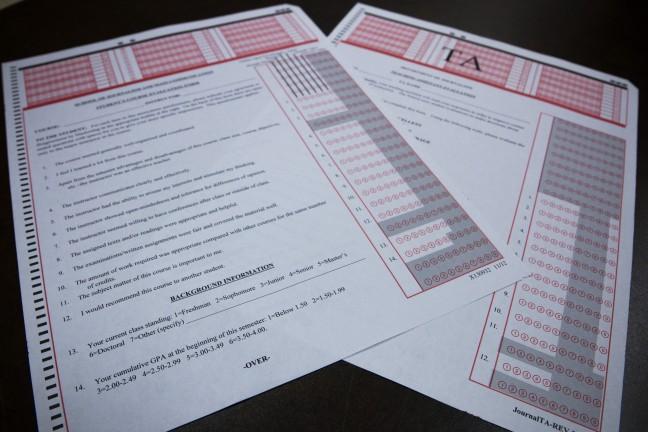It’s that part of the semester again: The professor awkwardly leaves the room while students rate how well the course went … or just fill in “neither agree or disagree” for every question.
University of Wisconsin students have filled out these course evaluations for more than 100 years, with each department determining the content it will include on them.
But amid attempts to bring course evaluations into the modern age, online evaluations now constitute about 20 percent of all evaluations at UW, and experts argue whether the current evaluations are effective at all.
Philip Stark, a statistics professor at University of California-Berkeley, argues for a more holistic approach to evaluate instructor effectiveness due to his view that course evaluations fall short of their intent and even incorporate student biases.
“Student course evaluations don’t measure what they claim to measure,” Stark said. “They are misleading, and there is now compelling evidence that they are biased against female instructors.”
In a study Stark coauthored with Richard Freishtat, the two authors claim course evaluations do not measure instructor effectiveness, but rather, student experiences are influenced by gender, ethnicity and attractiveness of instructor.
Regarding these biases, Molly Steenson, a UW journalism professor, said while she understands the importance of student course evaluations, she sees various issues with their current use.
She said various studies show course evaluations tend to be stronger for men than for women, stronger for whites versus people of color and are often brutal toward individuals who have an Asian accent.
While she constantly strives to better her teaching, she said it depends how seriously she can consider input when students can sometimes be unnecessarily harsh in their comments.
“I had one semester where I tried something new and a couple of students said really mean things in reviews and frankly, I felt shitty for three weeks,” Steenson said.
Steenson said a solution she used to improve her own course was having her Journalism 201 students fill out a questionnaire mid-semester so she could improve student experiences early on.
Stark and Freishtat argue student course evaluations can serve a more limited but still valuable role through providing instructors information about their students’ experiences.
To truly evaluate instructor effectiveness, Stark and Freishtat argue course evaluations must include the right questions, such as quality of instructor’s handwriting, audibility of instructor’s voice and enjoyment of interest in course material.
But this is only a portion of the holistic approach — they also argue for the inclusion of teaching portfolios and expert course evaluations in a review process.
Steven Cramer, UW vice provost for teaching and learning, said the solution to realizing the potential of course evaluations lies in increasing the use of online as opposed to paper evaluations.
He said online evaluations provide students with more time to complete the forms and allow departments to more easily customize and update their own evaluations.
Completion rates for online evaluations, however, are still much lower for online as opposed to paper course evaluations, James Wollack, director of UW’s testing and evaluation services, said.
As it stands, he said only around 55 percent of students complete online forms while upward of 90 percent complete paper-based forms.
Cramer said UW has looked into solutions for increasing these rates, and believes the answer lies in professors better articulating the benefits for all parties involved.

















